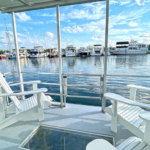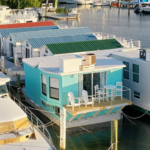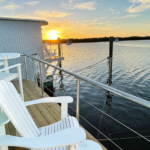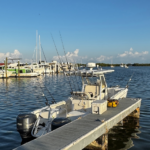
Houseboats Investment: Pros and Cons Explained
The idea of owning a houseboat combines the allure of waterfront living with the freedom of mobility. For many, houseboats represent not only a unique lifestyle but also a potential investment opportunity. But before diving in, the important question is: Are houseboats a good investment?
In this comprehensive guide, we’ll analyze the financial pros and cons of a houseboats investment, helping you understand the monetary benefits and challenges. From purchase costs and maintenance to resale value and rental income potential, we’ll cover everything you need to know.
Understanding Houseboats as an Investment
Unlike traditional real estate, houseboats are classified as personal property or recreational vehicles rather than real estate in many jurisdictions. This distinction affects financing options, taxation, and how they appreciate or depreciate over time.
While a houseboat can be a home, a vacation property, or a rental asset, its financial performance as an investment differs from a typical residential property.
Financial Pros of Houseboats Investment
1. Lower Entry Cost Compared to Waterfront Homes
Buying waterfront real estate often comes with a hefty price tag, especially in popular coastal or lakeside areas. Houseboats can offer a more affordable way to enjoy waterfront living, sometimes at a fraction of the cost of a lakeside cabin or oceanfront condo.
-
New or used houseboats can range from $30,000 to $500,000, depending on size and amenities.
-
Marinas typically charge monthly mooring fees, which can be less costly than property taxes and maintenance on land-based homes.
This lower upfront capital requirement can make houseboats investment attractive for those seeking an alternative to traditional homes.
2. Potential Rental Income
Many houseboat owners rent their boats as vacation homes or short-term rentals. With the rise of platforms like Airbnb and Vrbo, renting out a well-maintained houseboat can generate steady income during peak seasons.
-
Unique waterfront experiences attract renters looking for something different.
-
Seasonal rental income can help offset ongoing costs like maintenance and marina fees.
This rental potential adds a layer of financial benefit, especially in tourist-heavy areas or scenic locations.
3. Lifestyle Value
While harder to quantify, the lifestyle benefits of owning a houseboat can be considered part of the return on investment.
-
Waterfront views, peaceful surroundings, and a sense of freedom often lead to increased happiness and wellbeing.
-
Houseboats can be a second home, vacation escape, or even a full-time residence, providing a blend of utility and enjoyment.
For many buyers, this lifestyle factor is a significant part of the decision to invest.
Financial Cons of Houseboats Investment
1. Depreciation vs. Appreciation
Unlike traditional real estate, houseboats generally depreciate in value over time.
-
Factors like wear and tear, hull integrity, and outdated systems reduce resale value.
-
Unlike land property, boats do not appreciate due to scarcity or development.
This depreciation means that houseboats investment should be viewed more like purchasing a vehicle or RV rather than a home expected to build equity.
2. Ongoing Maintenance and Repair Costs
Houseboats require continuous upkeep to remain safe and attractive.
-
Regular hull maintenance, engine servicing, and marine-grade cleaning products add up.
-
Weather exposure accelerates wear on exterior finishes and mechanical systems.
-
Annual maintenance budgets can range from $1,000 to $5,000 or more.
Unexpected repairs, such as hull damage or plumbing issues, can be costly and must be factored into your investment analysis.
3. Marina and Mooring Fees
Unlike owning land, you must pay to dock your houseboat.
-
Monthly marina fees vary widely by location but can run from $300 to over $1,000.
-
Additional liveaboard fees, utilities, and services increase overall expenses.
-
In some markets, marina space can be limited, adding uncertainty to long-term mooring options.
These fees can significantly impact your net return if you rely on rental income.
4. Financing and Insurance Challenges
Houseboats are often financed differently than homes, sometimes requiring higher down payments and carrying higher interest rates.
-
Insurance premiums tend to be higher than homeowner’s insurance due to marine risks.
-
Coverage is needed for liability, physical damage, and sometimes personal property onboard.
These costs reduce the financial attractiveness of a houseboats investment, especially for first-time buyers.
Other Considerations in Houseboats Investment
Resale Market and Liquidity
The market for houseboats is niche and can be less liquid than traditional real estate.
-
Selling a houseboat may take longer, especially in soft markets or off-season.
-
Condition, location, and demand greatly influence resale price.
-
Upgrades and modern amenities can enhance value but rarely generate substantial appreciation.
Potential investors should prepare for a longer holding period and less predictable resale outcomes.
Tax Implications
Taxation of houseboats varies by jurisdiction and use.
-
Some places classify houseboats as personal property, subject to different tax rates than real estate.
-
Rental income is typically taxable and requires proper reporting.
-
Deductions may be available for maintenance and operational costs when renting.
Consult a tax professional to understand local laws and optimize your investment strategy.
Is Houseboat Investment Right for You?
A houseboats investment can be rewarding financially and personally, but it requires careful planning and realistic expectations.
Ask yourself:
-
Do you want a floating home primarily for personal use, or as an income-generating asset?
-
Are you prepared for maintenance and operational responsibilities unique to boats?
-
How comfortable are you with the potential depreciation and limited liquidity?
-
Can you afford the ongoing costs of mooring, insurance, and utilities?
If the lifestyle benefits and unique experience outweigh the purely financial considerations, houseboats can be a worthwhile investment.
Tips to Maximize Your Houseboats Investment
-
Buy Quality and Condition: Investing in a well-maintained, newer model reduces repair risks.
-
Select High-Demand Locations: Marinas near popular vacation spots improve rental income potential.
-
Keep Up with Maintenance: Preventative care protects your investment and attracts renters or buyers.
-
Consider Seasonal Rentals: Renting your houseboat part-time offsets costs without giving up personal use.
-
Work with Experts: Consult marine surveyors, real estate agents specializing in houseboats, and tax professionals.
Are houseboats a good investment? The answer depends on your goals and approach. While they rarely appreciate like land real estate, they offer an affordable entry into waterfront living with unique lifestyle perks and rental income opportunities.
Understanding the financial pros and cons of houseboats investment helps you make an informed choice—balancing cost, enjoyment, and potential returns.
Frequently Asked Questions (FAQs)
Is a houseboats investment better than buying a traditional home?
It depends on your goals. A houseboats investment often offers a lower entry cost and unique lifestyle benefits, but unlike real estate, houseboats typically depreciate over time rather than appreciate.
Can I earn rental income through a houseboats investment?
Yes, many owners generate income by listing their houseboats on platforms like Airbnb or Vrbo. In popular tourist locations, short-term rentals can offset marina fees and maintenance costs, improving your overall houseboats investment returns.
How much should I budget annually for a houseboats investment?
Annual costs for a houseboats investment vary, but typically include marina fees ($3,000–$12,000), insurance, maintenance ($1,000–$5,000), and utilities. Rental income and smart budgeting can help manage these expenses.
Do houseboats appreciate or depreciate over time?
Unlike real estate, most houseboats investment opportunities involve depreciation, much like vehicles or RVs. However, well-maintained boats in prime locations can retain value longer and command good rental rates.
Are there tax advantages to a houseboats investment?
In some regions, you may be eligible for tax deductions on mortgage interest, rental expenses, or business use of the boat. It’s important to consult a tax advisor to understand how your houseboats investment is classified legally.





